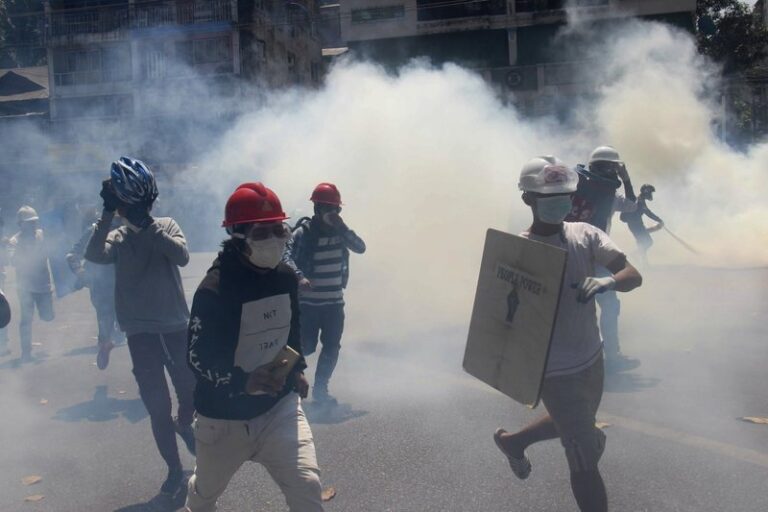
(AP) — Police in Myanmar’s biggest city on Monday fired tear gas at defiant crowds who returned to the streets to protest the military’s seizure of power a month ago, despite reports that security forces had killed at least 18 people around the country a day earlier.
The protesters in Yangon were chased as they tried to gather at their usual meeting spot at the Hledan Center intersection. Demonstrators scattered and sought to rinse their faces with water in vain attempts to ease the irritating effects of the gas.
In the capital, Naypyitaw, the country’s ousted leader Aung San Suu Kyi made a court appearance Monday via videoconference, the independent Myanmar Now online news agency reported. It said she received a charge under Section 505(b) of the Penal Code for allegedly inciting unrest. Further details of the court appearance were not immediately available.
Suu Kyi had already been charged with two other offenses — possession of walkie-talkies that had been imported without being registered, and violating an order issued under the Natural Disaster Management Law limiting public gatherings in order to fight the spread of the coronavirus.
The 75-year-old Suu Kyi was initially detained by the military at her Naypyitaw residence, but fellow members of her National League for Democracy party are uncertain of her present whereabouts. If she is convicted, the charges against her could provide a legal way of barring her from running in the election the junta has promised in a year’s time.
At least five people were believed to have been killed Sunday in Yangon when police shot at the protesters, who are demanding that Suu Kyi’s elected government be restored to power after being ousted in a Feb. 1 coup. The protesters’ civil disobedience movement has adhered so far to the the tenets of nonviolence despite provocation from the security forces and pro-military counter-demonstrators.
People erected makeshift sidewalk shrines at the spots where several of the victims were shot and also paid their respects by standing outside the hospitals from which the bodies of the victims were being released to their families.
In Dawei, a small city in southeastern Myanmar where an estimated five people were killed Sunday, the number of protesters on the streets Monday was lower than usual. Marchers there split into smaller groups, parading through the city to the applause of bystanders who also made the three-finger salutes adopted by the resistance movement to show their support.






